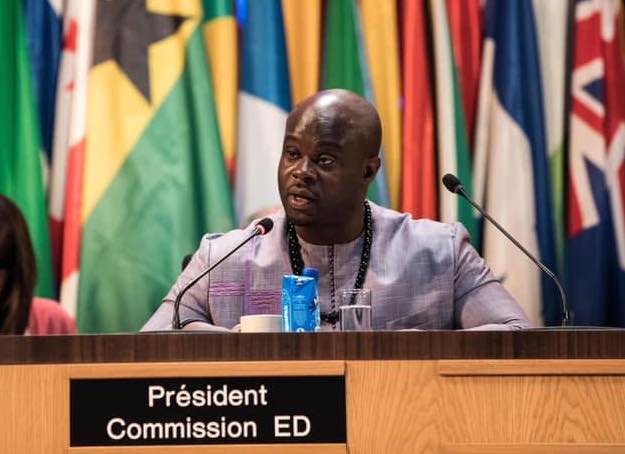PARIS, France – A Liberian representative, Gbovadeh Gbilia, has been elected vice-chair on the Education Commission of UNESCO at the organization’s just ended 40th Conference meeting in Paris, France.
Gbilia’s election to the 193-member organization grants Liberia a seat on the leadership of the influential commission of that important world body.
In an interview with members of the press, Gbilia expressed excitement over his election: “We were blessed, honored, and highly privileged to be selected among countries that vied for the position of vice-chair on the Education Commission at UNESCO. Liberia won the seat on the high table at the UNESCO conference 2019 from among 33 nations that competed for the post, which runs for two years.â€
With Gbilia’s election, Liberia now sits on this crucial commission of UNESCO. He reiterated the importance of education as the most powerful tool for progress and transformation in every society.
“We have to build peace in the minds of girls and boys, women and men, and to transform our world. We count on your support to defend education, protect it, not only for today, but for the many possible pathways of education for future generations to come,†Gbilia said.
This year’s conference focused on youth and youth-led organizations across the world, and how they can be more meaningfully engaged in solving global challenges.
“The bright solutions, which our world so desperately needs, lie in the minds of our bright youth and there is need to increase our efforts to incorporate youth into our decision-making processes, so that they have a seat at the table right beside us,†Gbilia explained the conference’s focus.
At this year’s gathering, a new UNESCO Strategy for Youth and Adult Literacy (2020-2025) was released, in recognition of the centrality of quality and inclusive education in offering lifelong learning opportunities to young people. This year’s strategy document, dubbed Education 2030, places particular emphasis upon the universality of literacy, and the importance of multilingualism and mother tongue language-based approaches to literacy development.
All of the 26 member states that took the floor during debates at the conference expressed full support for the vision of the education sector expressed in its strategy document, and were equally supportive of the organization’s new International Standard Classification of Education for teacher training programs. This would mean building existing tools and standards already in place at UNESCO Institute for Statistics.
Under its new strategy, the Education Commission will focus on teachers, higher education, and skills development, including TVET and digital skills.
The chairperson of the commission, Shafqat Mahmood of Pakistan’s Federal Ministry of Education, Professional Training, and Heritage, said the Education 2030 Agenda, though ambitious, is feasible and achievable within its target timeframe. But first, political will would be needed at the highest level to ensure both effective financing and implementation of the strategy.
Also speaking at the event, the assistant director-general for education, Stefania Giannini, seized the opportunity to outline the changing context reflected in global trends, including mobility, digitalization, and climate change that are increasingly affecting education today.
She underscored four flagship initiatives intended to help accelerate progress towards Sustainable Development Goal 7, with approaches targeting girls’ and women’s education; education for vulnerable migrants, refugees, and internally displaced persons; higher education as essential to innovation and transformation; and finally, to UNESCO’s new flagship initiative on the Future of Education.
Giannini also reassured members states that they will maintain its two strategic axes and its alignment with Sustainable Development Goal 4. In this respect, she highlighted the role of the Capacity Development for Education Programme as an example of an operational delivery modality.
The conference made history on Nov. 14 with the unanimous adoption of the Global Convention on the Recognition of Qualifications Concerning Higher Education, making it the first United Nations treaty on higher education with a global scope.
Featured photo courtesy of Gbovadeh Gbilia



